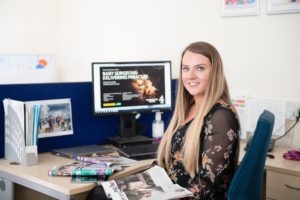Pippa Harper
Pippa Harper is the Trust’s Media Manager and has worked in the communications team at St George’s for six and a half years.
She joined the Trust from working in journalism at the Press Association, where she mainly wrote for health and lifestyle audiences.
Pippa project managed Baby Surgeons: Delivering Miracles from the St George’s side from concept through to broadcast and here, we find out a bit more about the role communications plays when managing a documentary series…
Why did you decide to take part in Baby Surgeons?
With Baby Surgeons, we knew the work of the fetal medicine unit and related services would make fascinating television but, more importantly, we believed it would enable us to i) communicate important messages about the work of a clinical service that is evolving and innovating all the time and ii) to show the public how difficult the decisions are for some of our patients, in this case women with complex pregnancies.
After speaking to key members of the team here at St George’s, and many meetings with Wonderhood, the production company, it felt like a good fit for us, and we decided to take part. I’m incredibly proud to have worked on the series from start to finish – from the initial concept stage back in 2019, right through all the important decisions around content, filming, access, the editing process, and into broadcast this year. It’s been a very rewarding experience.
We provide a wide range of hospital services at St George’s, so we are fortunate to receive documentary requests from production companies nearly every week. Inevitably, we can’t and don’t take part in every documentary we are approached about – simply because it’s a huge amount of work for everyone involved and, more importantly, it needs to be right for our staff, patients, and the wider organisation.
What are the challenges of filming a documentary in a hospital?
There are many – and that’s without the added complexities presented by a global pandemic! There are all the obvious logistical challenges you’d imagine, but when looking ahead to the finished programmes, it’s so important to clearly understand the type of programme the production company want to make, and how this fits with what we (the hospital, and our staff) want to achieve.
Consent is one of the most important issues, and staff and patients are always asked if they want to take part in filming – and if they don’t, we completely respect their decision, and it has zero impact on the care they receive. Patients who do consent to be on TV are supported every step of the way, particularly with documentaries like Baby Surgeons which cover difficult issues such as miscarriage. Everyone at St George’s has a huge amount of respect for all those patients who agreed to take part in Baby Surgeons.
What are the benefits of taking part in documentaries?
Again, there are many. The NHS is a fantastic organisation to work and be treated in – but it’s also regarded very fondly by the public, many of whom love to watch it on screen.
NHS documentaries are a great way to promote individual Trusts – and the NHS more broadly – as a place to work, highlighting the excellent services available, and the people who keep the NHS going 24 hours a day, seven days a week. We’ve seen this directly as the home of Channel 4’s 24 Hours in A&E since 2014 too.
With Baby Surgeons, however, we also wanted to play a part in raising awareness and breaking the silence around baby loss, including miscarriage and stillbirth. In 2021, it’s still something that has stigma attached to it, despite 1 in 4 pregnancies ending in baby loss.
Through our live tweeting during each episode, we’ve received messages from parents who have experienced similar things to those who feature in the series, and conversations have started up online, which is really positive.
Channel 4 and Wonderhood have also since launched pregnancy loss policies to support their staff going through such experiences. This is a perfect example of a documentary series that is actively helping to create meaningful change. For us, it needs to be more than about just being on TV!
How does the filming itself work with clinical teams, patients and the production company?
Successful documentary projects are based on a huge amount of trust and mutual respect, so relationship building is a really important part of the process.
After initial introductions, the production team spent some time shadowing our clinical teams to understand the patient pathways, the types of conditions seen, and to get to know staff better; this was all done without cameras being present. This was such an important step for everyone to get to know one another, and for staff to feel reassured by the production company’s presence before we officially started filming.
As the project progressed, our clinical teams supported the production process by speaking to some patients about the programme to see if they would be interested in being involved. The Wonderhood team have been great in liaising with patients and their families since the start, and they continue to check in with and support patients during the series post-broadcast too.


